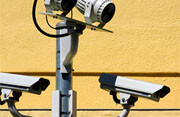By 2014, New Songdo in South Korea is slated to be the world's largest "ubiquitous city," with tracking devices installed virtually everywhere and all major information systems—residential, medical, commercial, governmental—linked to one another to share data. Supporters hope the $25 billion project will spur foreign investment in the country by showcasing advanced technologies such as smart-card readers, which can alert parents when their children arrive at school, among other uses. South Korea tested its first ubiquitous city, or U-city, last year and has a smaller model planned for completion in 2009.
The surveillance industry is booming, and you don't have to live in a U-city to feel like your every move is being traced. Daily transactions such as email exchanges and credit card payments leave a data trail which can be used for consumer research and government investigations, and some website companies, such as Zaba Inc. and Spokeo Inc., allow individuals to "spy" on one another's personal details.
Radio Frequency Identification (RFID) tags can be implanted in humans to track the movements of workers. They've also been added to passports to store personal information. Some billboards are now equipped with tiny surveillance cameras and facial recognition software to determine the gender and age of passersby, as well as whether and for how long they look at the advertisements.
With recent developments in information technology, surveillance devices can now be produced in smaller sizes—sometimes microscopic—and systems can be networked in new ways. In some cases this results in more convenience and better security. But the ability to collect, store, analyze, and transfer data in increasingly pervasive and decreasingly detectable manners raises privacy concerns.
Even when consumers wittingly allow their personal data to be collected, they may not be aware of the full implications. According to David Lyon, Director of the Surveillance Project at Queen's University, social sorting, or the classification of individuals based on socioeconomic data, is a common goal of surveillance. The practice often results in differential treatment for people in the various categories. Retailers use aggregated data to target advertisements to certain income brackets, while insurers may charge a higher premium for individuals whose supermarket loyalty cards show they've been buying junk food or cigarettes.
Data aggregator ChoicePoint came under fire in 2005 after it inadvertently sold the personal data of roughly 140,000 Americans to identity thieves. Function creep, or the use of data and devices for purposes other than their original intent, can also put physical security at risk. In 2006, Yahoo! Inc. released data about Wang Xiaoning to the Chinese government, resulting in Wang's arrest and 10-year imprisonment for advocating democratic reform and a multiparty system in China.
Last year, U.S. hedge funds invested more than $150 million in China's surveillance companies. The city of Shenzhen alone will have as many as 2 million security cameras installed over the next three years. Combined with Internet regulation, facial recognition software, and RFID-enabled national identification cards, the cameras are part of China's own experiment in "ubiquitous" surveillance. The country's so-called "Golden Shield" will allow police to easily identify, locate, and detain citizens who promote the human rights and religious freedoms deemed illegal by the Chinese Communist Party.
While some people argue that democratic governance provides protection against surveillance abuse, surveillance itself can in fact threaten democracy. According to Privacy International's 2007 report, the United States and the United Kingdom rank alongside China as some of the most "endemic" surveillance societies. The United Kingdom has the most surveillance cameras per capita in the world, with one camera for every fourteen people. Junior officials, now permitted to initiate surveillance operations in the name of national security, have used their authority to prosecute petty crimes like littering.
The right to privacy is fundamental to the democratic principles of debate and dissent. And protection of minorities, another integral component of a healthy democracy, can also be eroded through surveillance measures when social sorting morphs into racial profiling. During World War II, Japanese Americans were targeted for internment using census data. Post-9/11 surveillance measures in the United States, such as illegal wiretapping and no-fly lists, are often aimed at Arab and Muslim Americans. Such practices, and the secrecy with which they occur, can undermine citizen trust in government.
Ben Franklin is credited with the phrase, "Those who would give up essential liberty to purchase a little temporary safety deserve neither." But the two aren't necessary mutually exclusive, and individuals don't always have a choice in the matter. Suzanne Spaulding, former legal counsel for the Central Intelligence Agency, suggests that civil liberties and national security are rather mutually reinforcing and argues for more public debate on the use of surveillance capabilities.
The future of networked surveillance technology, and ubiquitous computing in particular, is considered a social experiment of sorts, the full effects of which won't be discernible for some time. It's been suggested that ethical guidelines for the use of such technologies be developed along the lines of social research principles: full disclosure of how data is collected and used; avoidance of financial, physical, and psychic harm; and, when possible, the ability for users to opt in or out.
![]() This article is licensed under a Creative Commons License.
This article is licensed under a Creative Commons License.
Please read our usage policy.




